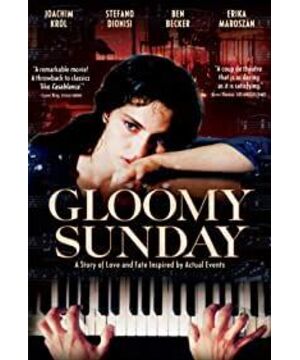"Melancholy Sunday" (also known as "Love in Budapest") is like a narrative poem, which perfectly integrates the three elements of war, triangular relationship and the legendary musical curse, and conveys the feelings of an art film to the audience by means of a drama film. In other words, this film uses three common motifs to create and tell a legendary, bleak and transcendent story. In the calm and plain narrative, the personal destiny and historical tragedy, the pure beauty of human nature and the unbalanced distortion of desire are used as nodes to weave a tension-rich emotional web. When the 80-year-old Irina finally hummed the deadly and beautiful song dedicated to her by her old lover to wash the plate that poisoned the German officer, she washed away the lust that had haunted her life and put an end to the chaotic and sad hatred , but can no longer find all the youthful time and the most moving lover in these times. Angels slayed demons, and since then, only the sound of the violin has been left behind. After the loss of life, emotion, youth and beauty, we can only choose to hide our faces and cry.
Apparently goolmy sunday's name comes from the legendary black tune, which provides the film with enough legend to captivate audiences. However, the film did not do more articles on this legend, and obviously used this legend to set the tone for some plots and characters between them. From the sublimation of legend to romance, it also contributed to the story logic of the film itself. For example, the character of the heroine, Yelena, is full of French romance. She has been chasing her personal erotic journey, and she is a little selfish but beautiful. She tried to have two men at the same time, and used her extraordinary wisdom and charm to completely achieve this selfish purpose. Although the harmony did not last long, she achieved a short-lived victory after all. The dangerous triangular relationship is interpreted so far, together with the queen of desire and the angel with charming eyes, although the whole is a little exaggerated, but the audience is convinced, as if these are real, this is the ultimate means of sublimation of legend to romance. manifestation.
If war and triangular relationships are all common themes, why is "Melancholic Sunday" so touching, sadistic and tangled? This has to say about the narrative rhythm of the film. The whole film tells the whole story in the continuous advancement of the audience's emotions one after another. The film does not give the audience any respite, and the grass snake online foreshadows thousands of miles in the quiet and touching tears. The main contradiction in the film before the war theme was involved was the triangular relationship, and when the restaurant manager Russlu and the pianist Anlas reached an agreement to share Irina, it seemed that all tension subsided immediately, and the film's mood was reached. It was peaceful for a while, but soon the German who once pursued Elena came back, and he brought not only the disaster of fascism but also the disaster that distorted the most terrible side of human nature. So, this short man named Hans began to show us a story of calculation and revenge, intertwined and unable to breathe. When the theme of war came to an end, the director spared no effort to continue to create a psychological gap for the audience. In the lost and confused eyes of Lashilu, Hans rescued the Jews who had paid, and pushed Lashilu to a concentration camp. the train. Gloomy sunday is like a sine curve, leading the audience on an emotional roller coaster. It is worth noting that the use of the theme music of the film aggravates the effect of emotional ups and downs.
While being tortured to death by the plot, the complexity and multifaceted nature of a character lead the audience into deeper thinking about human nature. In thinking about this character’s character, the audience can easily parse out the complexities of human nature from it. Tension, ugliness, and beauty, and then map them into his own life, and think outside the context of the film. This character is obviously Hans, a short German man with a Napoleonic complex, from a dull and introverted little person who lost his confidence because of courtship, through a series of mental struggles that are omitted but predictable in the film and After hard work, he finally became a colonel. He hates and retaliates because of love, and he is arrogant because of inferiority. He wants to sweep away the shadow of his soul through physical conquest, and hopes to protect himself through philistine behavior. He abandoned his original simple dream and jumped from a pure young man to a Nazi who was scheming for public benefit. These distorted changes not only have a realistic impact, but also the ugliness and evil bred within human nature are also factors that cannot be ignored. At the same time, in shaping Hans' despicable behavior, the film also added some "good" factors. For example, he gave some money to the Jewish woman who came to apply for the pass, reflecting the interweaving of good and evil, and the incomparably three-dimensional human connotation .
It is in the ups and downs of the triple motif of war, triangular relationship and musical curse, and in the sultry music, gloomy sunday leads us to see in tears love, passion, disaster, death and all that is entangled in fate. Unspeakable joy and pain.
View more about Gloomy Sunday reviews











